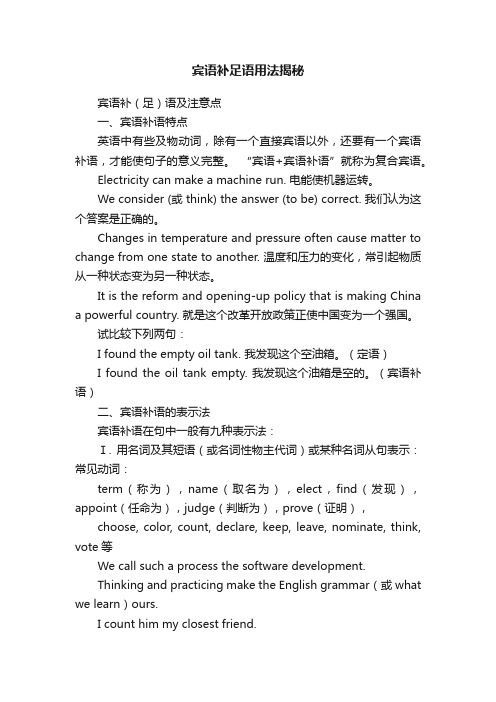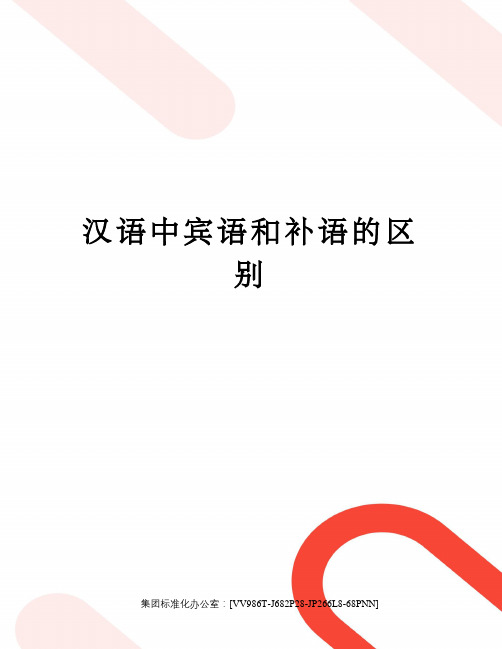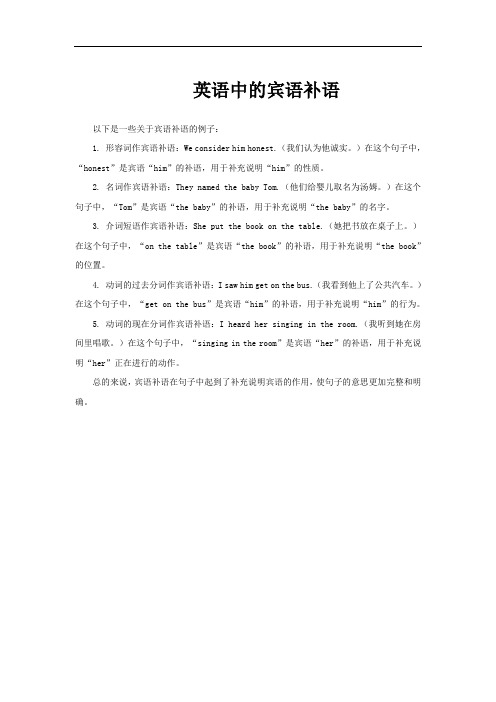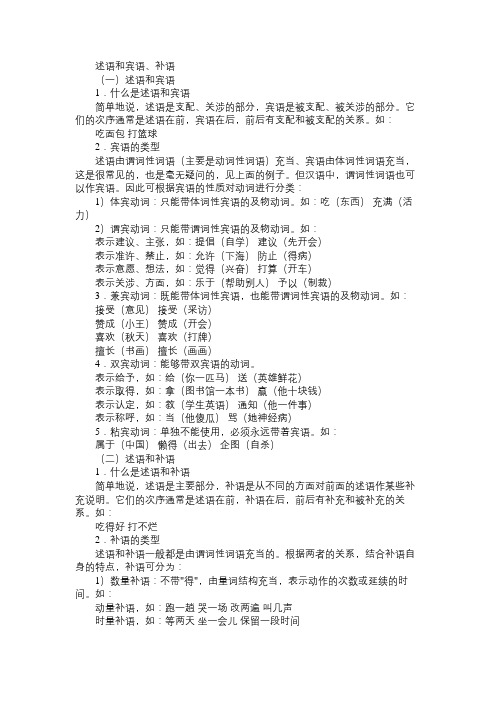宾语补语
宾语补足语用法揭秘

宾语补足语用法揭秘宾语补(足)语及注意点一、宾语补语特点英语中有些及物动词,除有一个直接宾语以外,还要有一个宾语补语,才能使句子的意义完整。
“宾语+宾语补语”就称为复合宾语。
Electricity can make a machine run. 电能使机器运转。
We consider (或 think) the answer (to be) correct. 我们认为这个答案是正确的。
Changes in temperature and pressure often cause matter to change from one state to another. 温度和压力的变化,常引起物质从一种状态变为另一种状态。
It is the reform and opening-up policy that is making China a powerful country. 就是这个改革开放政策正使中国变为一个强国。
试比较下列两句:I found the empty oil tank. 我发现这个空油箱。
(定语)I found the oil tank empty. 我发现这个油箱是空的。
(宾语补语)二、宾语补语的表示法宾语补语在句中一般有九种表示法:Ⅰ. 用名词及其短语(或名词性物主代词)或某种名词从句表示:常见动词:term(称为),name(取名为),elect,find(发现),appoint(任命为),judge(判断为),prove(证明),choose, color, count, declare, keep, leave, nominate, think, vote等We call such a process the software development.Thinking and practicing make the English grammar(或 what we learn)ours.I count him my closest friend.His father died young, leaving him an orphan.The sun set colored the sky a brilliant red.II. 用形容词及其短语表示:动词:beat, believe, boil, burn, color, count, drink, cut, declare, dye, feel, fill, hold(认为),leave, let, prefer, prove, render, set, shout, strike, talk, want, wish, think,see,have,keep,judge,wipe (如wipe… dry 将…擦干),wash(如wash… clean 将…洗干净),push(如 push the door open 把们推开),drink(如 drink a well dry 将井水喝干),hold(如hold… silent 使…安静)等。
英语宾补的七种形式

英语宾补的七种形式English:There are seven forms of English object complements. The first form is the objective complement, which renames the direct object. The second form is the factitive complement, which describes the resultof the action on the direct object. The third form is the subjective complements, which renames the subject of the sentence. The fourth form is the adverbial objective complement, which modifies the action of the direct object. The fifth form is the prepositional objective complement, which consists of a prepositional phrase that renames the direct object. The sixth form is the nominative absolute, which renames the subject of the sentence and is often found in formal writing. The seventh form is the gerund complement, which consists of a gerund that describes the action of the direct object.中文翻译:英语宾语补语有七种形式。
英语补语例句解析

英语中的补语
补语包括主语补语和宾语补语。
宾补也可以是从句,即宾补从句。
如:
1. 主语的补语
(1)The plan landed safe. 这架飞机安全着陆。
(safe 就是主语的补足语)(2)He died young. 他英年早逝。
(young 就是主语的补足语)
(3)She went away quite a child and returned a grown-up woman. 她离家使还是个小姑娘,回来是已经是个成年妇女了。
(quite a child 和 a grown-up woman就是主语的补足语)
(4)He is made to copy the sentence. (不定式就是主语的补足语)
2. 宾语的补语
(1)We made him copy the sentence. 我们让他抄写这个句子。
(copy the sentence就是宾语的补足语)
(2)Father will not allow us to play on the street. 父亲不让我们在街上玩耍。
(不定式就是宾语的补足语)
(3)You can call me what / whatever you like. 你叫我什么都行。
(从句what / whatever you like就是宾语的补足语)
(4)We will soon make our city what your city is now. 我们很快就会把我们的城市建设成你们现在城市的样子。
(从句what your city is now就是宾语的补足语)。
汉语中宾语和补语的区别完整版

汉语中宾语和补语的区别集团标准化办公室:[VV986T-J682P28-JP266L8-68PNN]三十四、汉语的补语包括哪些类型补语与宾语如何区分1、汉语的补语包括结果补语、趋向补语、可能数量、可能补语、数量补语、状态补语、程度补语、时间处所补语。
2、补语和宾语都出现在述语之后,补语主要由谓词性成分充当,作用在于补充说明动作的结果、状态、程度、趋向、可能性等。
宾语主要由体词性成分充当,作用在于指出述语所关涉、支配的人或物。
但是谓词性成分也可以作宾语,而且补语和宾语都可以由量词短语充当。
补语和宾语的区别在于:①补语、宾语与述语之间的语义关系不同。
补语与述语之间是补充说明关系,回答“怎么样”的问题;述语与宾语之间是支配关系,回答“什么”的问题。
②短语作宾语时,述语和宾语之间不能出现结构助词“得”,而短语作补语时,述语和补语之间必须出现结构助词“得”(表示否定的可能补语例外)。
③述宾短语中的述语一般可以用肯定否定的形式提问,而述补短语中的述语不能这样提问。
④宾语有时可以移至述语前,构成受事主语句或“把”字句。
补语的位置比较固定,只能出现在述语后面。
此外,如果述语后出现表示动量成分,一般是补语;如果述语后出现表示物量成分,一般是宾语。
补语和宾语都位于动词后,宾语多数是名词性成分,补语是谓词性成分,但宾语可能用谓词性成分,补语可能用表时段的名词性成分,两者都可用量词短语充当。
划分宾语和补语:1、看关系,宾语回答的是“什么”的问题,如“喜欢安静”,有动宾关系,补语回答的是“怎么样的”问题,是补充说明,如“考虑清楚”;2、看成分的词性:量词短语里如果用物量词,一般是宾语,如“看几本”,如果用动量词,一般是补语,如“看几遍”;3、某些表示时间的成分既可能作补语,也可能作宾语,作宾语时往往可以变换成“把”字句,如“他浪费了两个钟头”可以变换成“他把两个钟头浪费了”,则“两个钟头”是宾语,而“他干了两个钟头”不能变换成“把”字句,则“两个钟头”是补语。
宾语补足语例句集锦

英语基础知识——句子成分学习之补语1.I saw you stand(ing) at the door.2.I find smoking bad for health.3.I saw the elevator up and down.4.I saw a bird in a cage.5.I find learning English difficult.6.I saw the kite up and down.7.I will have my son repair the TV.8.I will have the TV repaired by my son.9.The weather is too hot. Don’t have the horse running all the way.10.The boy was late again. The teacher had him standing the whole morning.11.I will get my son to wash the car.12.I will get the car washed by my friend.13.I will get everything ready.14.He often makes us laugh.15.He can make you happy.16.We will make him monitor.17.He wants to make himself seen/ found/ noticed/ heard/ known/ understood.18.They made the Italian archaeologist John director of the team.19.We found the ruins most interesting.20.Please tell her to wait for me at the school gate at 3:00 p.m.21.We found ourselves in the middle of the desert. 22.Did you see someone come into the room?23.I heard Mary singing in the next room at this time last night.24.We found ourselves at the foot of the mountain. 25.Did you see someone take away my car key?26.Please don’t make the girl cry again.27.Please let me help you (to) clean the house.28.We all found it worthwhile to argue with them about the matter.29.I find it good manners to speak to others in this way. 30.He considers it his duty to raise his family.31.We think it no use complaining.32.He made it clear what he intended to do.33.He feels it interesting to play with such old men. 34.We find it difficult to found an organisation.35.She thought it her duty to take good care of them. 36.They consider it pleasant that they worked with us Chinese.37.Everybody finds it no use doing it over and over again. 38.The boy found it hard to get up early in the morning in winter.39.She felt it boring to talk with him.40.He makes it a rule never to borrow money.41.I think it no good going there now.42.The headmaster has made it clear that the sports meeting will not be delayed.43.The headmaster has made it clear not to delay the sports meeting.44.According to research, over two-thirds of young people find it easier to make friends online than “in real life”. 45.His father named him David.46.They painted their boat white.47.You mustn’t force him to lend his money to you. 48.We saw her enter the room.49.We found everything in the lab in good order.50.We will soon make our city beautiful and clean.51.I want to have my computer repaired.52.She told him to leave the keys on the table.53.I often find him reading in the library.54.He told us to leave here, for he would have his hair cut. 55.His mother named him Jack.56.They painted the door blue.57.He can make me happy.58.Don’t force him to wash your shoes.59.I will have my hair cut tomorrow.60.I found everything in the room in good condition. 61.The man will get us to clean the window.62.He is often found reading in the library.63.I noticed her open the door and enter the room. 64.Let the dog out, and I will have the floor swept. 65.He made himself understood by giving a good description.66.The boy broke the precious vase, so his mum had him working in the garden the whole morning.67.I will have your son write a report about the accident. 68.They appointed him manager.69.She colored the trees green.70.This set them thinking.71.We found the house deserted.72.The war made him a soldier.73.The teacher asked the students to close the door. 74.He saw a cat running across the road.75.I found him steal a book from the library.76.He told us to clean the room, for he would have his friend stay here a few days.77.We all call him Old Jack.78.You mustn’t force him to lend his money to you. 79.I will have my hair cut tomorrow.80.Let the fresh air in, and I will have the room cleaned. 81.He found his new job boring.82.They called their daughter Mary.83.This placed her in a very difficult position.84.We went to her house but found her out.85.What do you advise me to do?86.We thought him to be an honest man.87.He believed them to have discussed the problem. 88.He believed her the right person for the job.89.Did you notice him come in?90.I saw her chatting with Nancy.91.They considered Paris the brain and heart of the country.92.The boy was beaten black and blue.93.I found the dog running through our garden.94.I found the vase broken.95.I find him a genius.96.I found the movie interesting.97.The father got his son to do his homework before 6pm. 98.You can get the car running when it's fueled.99.You can get the car fixed.100.I can get you out of here.101.He could hear his heart beating fast.102.Do you smell something buring?103.He required us to be present at the meeting.104.I found him in yesterday.105.We must keep our classroom clean.106.We call them mooncakes.107.In the country, we can hear birds singing.108.I often see him play football.109.She often asks me to help her.110.We don't allow such things to happen again. 111.Most of the parents agree to forbid their children to smoke.112.She asked me to answer the phone in her absence. 113.Please remind me to leave her this note.114.She requested him to go with her.115.I often help my mother (to) do some housework. 116.What would you have me do?117.She made him give up smoking.118.Let him do whatever he wishes to do.119.Though he had often made his little sister cry, today he was made to cry by his little sister.120.He wants to have his eyes examined tomorrow. 121.Be careful, or you'll have your hands hurt.122.He had the walls painted this morning.123.I'm waiting for James to arrive.124.He's arranged for a car to pick them up at the station. 125.The UN has called on both sides to observe the rule. 126.There was so much noise that the speaker couldn’t make himself heard.127.When he awoke, he found himself being looked after by an old woman.128.The father wants his daughter taught the piano. 129.I saw an old man knocked down by a car just now. 130.Have you got your films developed?131.The murderer was brought in, with his hands tied behind his back.132.With water heated, we can see the steam. 133.With the matter settled, we all went home.134.A good friend is someone who makes you happy. 135.They made me repeat the story.136.He raised his voice to make himself heard. 137.We made him monitor of our class.138.My parents have always made me feeling good about myself, even when I was twelve.139.With so many people communicating in English every day, it will become more and more important to have a good knowledge of English.140.With everything he needed to buy, he went into the store.141.With everything he needed bought, he left the store. 142.With my key lost, I couldn’t enter my room. 143.With nothing to do, I went out for a walk.144.I went out with the window open.145.She said good-bye with tears in her eyes.146.He left the room with the light still on.147.I’ll have my hair cut this afternoon.148.I won’t have you saying to your mother that way. 149.He realized that she did not wish to have her go with him.150.I expect Amy will have the tea ready directly.151.I had the door painted last week.152.He had his pocket picked.153.She had her watch stolen.154.Jenny hopes that Mr. Smith will suggest a good way to have her written English improved in a short period. 155.You should understand the traffic rule by now. You’ve had it explained often enough. 156.You will find it a very difficult book.157.The youth found it a hard problem to think about. 158.When he came to himself, he found himself surrounded by a group of boys.159.I hope to find you in better spirits when we meet again. 160.I find the Chinese people to be happy and cheerful. 161.A cook will be immediately fired if he is found smoking in the kitchen.162.Please excuse me if I have left any of your questions unanswered.163.He got up slowly leaving the lunch unfinished. 164.Did you leave the doors and windows firmly fastened? 165.Don’t leave her waiting outside in the rain. 166.They went off together and left me sitting there. 167.We left him painting the gate.168.The papers were left lying around.169.You’d better leave the drawing-room door open. 170.His illness has left him weak.171.The window was left open.172.Leave him in peace!173.His illness left him with a weak heart.174.You’ve left her name off the list.175.I was left without a ray of hope.176.Through the wall he could hear Harris cleaning his teeth.177.She could hear the rain pattering against the windows. 178.Have you ever heard a pop song sung in Japanese? 179.I won’t hear anything said against him behind his back.180.After a knock at the door, the child heard his mother’s voice calling him.。
语法之宾语补语解析

语法之宾语补语解析宾语补语是指在英语句子中用来补充宾语信息的成分。
宾语补语可以使句子更加完整,进一步描述或解释宾语。
在本文中,我们将详细解析宾语补语的种类和用法。
一、名词性宾语补语名词性宾语补语是由名词、代词、动名词、不定式或从句等构成的,用来补充宾语的信息。
以下是常见的名词性宾语补语:1. 名词补语:通常是指代或说明宾语的词或词组。
例如:- He considers himself a genius.(他认为自己是一个天才。
)- I find the idea fascinating.(我发现这个想法很迷人。
)2. 代词补语:通常是用来代替宾语或指代宾语的事物。
例如:- They elected him their leader.(他们选他当他们的领导。
)- We consider them friends.(我们把他们当作朋友。
)3. 动名词补语:通常是由动名词构成的短语,用来补充宾语的动作或状态。
例如:- I enjoy swimming.(我喜欢游泳。
)- They admitted cheating in the test.(他们承认考试作弊。
)4. 不定式补语:通常是由不定式构成的短语,用来补充宾语的动作或目的。
例如:- She wants to become a doctor.(她想成为一名医生。
)- They need somebody to help them.(他们需要有人帮助他们。
)二、形容词性宾语补语形容词性宾语补语用来补充宾语的特征或状态。
常见的形容词性宾语补语有以下几种情况:1. 形容词补语:通常是用来描述宾语的特征或状态。
例如:- They painted the room red.(他们把房间涂成红色。
)- I consider him reliable.(我认为他可靠。
)2. 介词短语:通常是由介词和名词构成的短语,用来描述宾语的位置、方向等。
例如:- She found the book on the table.(她在桌子上找到了这本书。
英语中的宾语补语

英语中的宾语补语
以下是一些关于宾语补语的例子:
1. 形容词作宾语补语:We consider him honest.(我们认为他诚实。
)在这个句子中,“honest”是宾语“him”的补语,用于补充说明“him”的性质。
2. 名词作宾语补语:They named the baby Tom.(他们给婴儿取名为汤姆。
)在这个句子中,“Tom”是宾语“the baby”的补语,用于补充说明“the baby”的名字。
3. 介词短语作宾语补语:She put the book on the table.(她把书放在桌子上。
)在这个句子中,“on the table”是宾语“the book”的补语,用于补充说明“the book”的位置。
4. 动词的过去分词作宾语补语:I saw him get on the bus.(我看到他上了公共汽车。
)在这个句子中,“get on the bus”是宾语“him”的补语,用于补充说明“him”的行为。
5. 动词的现在分词作宾语补语:I heard her singing in the room.(我听到她在房间里唱歌。
)在这个句子中,“singing in the room”是宾语“her”的补语,用于补充说明“her”正在进行的动作。
总的来说,宾语补语在句子中起到了补充说明宾语的作用,使句子的意思更加完整和明确。
语文知识述语和宾语、补语

述语和宾语、补语(一)述语和宾语1.什么是述语和宾语简单地说,述语是支配、关涉的部分,宾语是被支配、被关涉的部分。
它们的次序通常是述语在前,宾语在后,前后有支配和被支配的关系。
如:吃面包打篮球2.宾语的类型述语由谓词性词语(主要是动词性词语)充当、宾语由体词性词语充当,这是很常见的,也是毫无疑问的,见上面的例子。
但汉语中,谓词性词语也可以作宾语。
因此可根据宾语的性质对动词进行分类:1)体宾动词:只能带体词性宾语的及物动词。
如:吃(东西)充满(活力)2)谓宾动词:只能带谓词性宾语的及物动词。
如:表示建议、主张,如:提倡(自学)建议(先开会)表示准许、禁止,如:允许(下海)防止(得病)表示意愿、想法,如:觉得(兴奋)打算(开车)表示关涉、方面,如:乐于(帮助别人)予以(制裁)3.兼宾动词:既能带体词性宾语,也能带谓词性宾语的及物动词。
如:接受(意见)接受(采访)赞成(小王)赞成(开会)喜欢(秋天)喜欢(打牌)擅长(书画)擅长(画画)4.双宾动词:能够带双宾语的动词。
表示给予,如:给(你一匹马)送(英雄鲜花)表示取得,如:拿(图书馆一本书)赢(他十块钱)表示认定,如:教(学生英语)通知(他一件事)表示称呼,如:当(他傻瓜)骂(她神经病)5.粘宾动词:单独不能使用,必须永远带着宾语。
如:属于(中国)懒得(出去)企图(自杀)(二)述语和补语1.什么是述语和补语简单地说,述语是主要部分,补语是从不同的方面对前面的述语作某些补充说明。
它们的次序通常是述语在前,补语在后,前后有补充和被补充的关系。
如:吃得好打不烂2.补语的类型述语和补语一般都是由谓词性词语充当的。
根据两者的关系,结合补语自身的特点,补语可分为:1)数量补语:不带"得",由量词结构充当,表示动作的次数或延续的时间。
如:动量补语,如:跑一趟哭一场改两遍叫几声时量补语,如:等两天坐一会儿保留一段时间2)趋向补语:不带"得",由趋向动词充当,表示动作的趋向。
- 1、下载文档前请自行甄别文档内容的完整性,平台不提供额外的编辑、内容补充、找答案等附加服务。
- 2、"仅部分预览"的文档,不可在线预览部分如存在完整性等问题,可反馈申请退款(可完整预览的文档不适用该条件!)。
- 3、如文档侵犯您的权益,请联系客服反馈,我们会尽快为您处理(人工客服工作时间:9:00-18:30)。
Object complement 宾语补足语
宾语补足语对宾语作出进一步的补充说明。 They called her the Loulan Beauty. 在这句话中,her是宾语,the Loulan Beauty 作宾语补足语,补充说明宾语her的情况。
make/ choose/ select + 名词+ 职务(不带冠词)
动词不定式做宾补
Tips:有些动词后面须接不带to的不定式 做宾语补足语,常用的动词有: make, let, have,(get) see; hear, watch, notice, feel; look at, listen to; observe help等, 但是句子变成被动语态后, 不定式 成为句子的主语补足语,需带to.
At last Obama was selected president of America. We all chose him representative of our team. They made Jim their leader in digging for the treasures in an ancient tomb near the mountain.
使役动词的用法: 1.let sb./sth. do sth. 无被动 2.make sb. /sth.do sth. 使某人做某事,sb. be made to do make sb./sth. done 使某人被…… 3.have sb./sth. do sth.使某人做某事(无被动) have sb./sth. doing sth. 使某人一直做(动作一 直进行) have sb./sth. done 使某人被… 或表示“遭遇不 幸” 4.get sb. to do sth.使某人做某事 get sb./sth. done使某人被…
catch sb. doing :抓住某人正在…. mind sb. doing : 介意某人做某事 imagine sb. doing : 想象某人做某事 leave sb./sth. doing : 使得/留下某人…. keep sb./sth. doing:使得某人…. The policeman caught the thief stealing. He left the light burning. I’m sorry to have kept you waiting. 注意:leave/keep也可用done做宾补,表示状态或被动 He left the homework unfinished. We keep the door closed.
Fill in the blanks. I heard someone _________me. calling I heard my name________. called
I found Tom _______ the window. break I found the window broken. _______
With water heated, we can see the steam. 水一被加热,我们就会看到水蒸气。(表条件) With the matter settled, we all went home. 事情得到解决,我们都回家了。(表原因)
注意:
• 在这一结构中,当宾语为某一身体部位,且 作宾补的动词是及物动词时,身体部位通常 是过去分词的逻辑宾语,因而过去分词不可 换用现在分词。 She stood in front of him, with her eyes fixed on his face. 她站在他面前,眼睛注视着他( fix one‘s eyes on 为固定短语,因此,不可将句 中 fixed 换为 fixing ) He stood for an instant with his hand still raised. 他仍然举着手站了一会儿。
感官动词see, notice, do表示动作全过程 hear, listen to, watch, + sb./sth.+ doing表动作正进行 feel, smeI hear them sing a song. I hear them singing a song. I hear a song sung. 注意:ing 和 ed 也可表状态,此时类似于adj.的作用 I find the match exciting. I find the students exctied.
过去分词做宾补
需用过去分词作宾语补足语的情况 1.使役动词get ,have ,make, keep,leave 等后,可用过去分词做宾语补足语,表: “致使某人或某事被…” We should keep them informed of what is going on here. Jane got her bad tooth pulled out at the dentist’s.
3. 表示“意欲;命令”的动词如 : like,order,want,wish,相当于过去分词短语前省 略了to be ,表示“希望/要求某人或某事被做” I wish these letters (to be) typed as soon as possible. The father wants his daughter taught the piano.
2 .感官动词feel, find, hear,notice,see,watch等 表示感觉和心理状态的动词之后, 表:“感受到某人或某事被做”。
I was sleeping when I heard my name called. He was disappointed to find his suggestions turned down.
Americans elect Obama (as) President of the USA . (Obama is their president.)
Tips: 当一个名词表示独 一无二的职位或头衔 (chairman,president , head, director, king, captain, monitor等)作 表语,同位语和补语时,前面常不用冠词 e.g. In 1399, Henry IV became King of England.(P.23 L.49)
现在分词做宾补
只能用现在分词作宾语补足语的动词有: catch, keep, mind, prevent, stop, smell, excuse 等。 例如: She caught her son smoking a cigarette. His words started me thinking.
He didn’t want such question discussed at the meeting.
解题要点: 首先要知道动词后是跟to do还是ing,ed, 或是原型。 其次要知道他们做宾补的区别: to do 做宾补常表示要去做的动作。 ing 做宾补常表示正在进行的或是延续的动作 ed 做宾补常表示被动的动作。 v.原型做宾补常表示动作全过程(跟在感官v.后) 此外,ing 和ed 做宾补还可以表示宾语的状态,此时 类似于adj. 最后根据题目的语境认真分析,选出语法和释义都 合理的最佳选项。
几个特殊句式
1、With的复合结构 V-ing P.P.V to do Adj. Adv. Prep.
With +n.+
with +宾语+过去分词”结构中,过去分词用 作介词 with 的宾语补足语。这一结构通常在句 中作时间、方式、条件、原因等状语。 例如: The murderer was brought in, with his hands tied behind his back. 凶手被带进来了,他的双手被绑在背后(表方式)
当用某些不及物动词的分词形式作身体部位 的宾补时,用现在分词的形式。 • She felt her heart beating fast. 她觉得心跳很快。(beat 意为“心跳”, 是不及物动词)
find/leave 的用法与with相似
consider regard
treat
2、
sb/sth to be(as)
look on have
think of
think of sb as/ think sb to be
